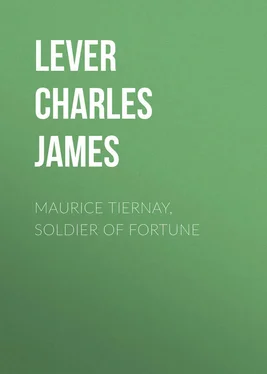Charles Lever - Maurice Tiernay, Soldier of Fortune
Здесь есть возможность читать онлайн «Charles Lever - Maurice Tiernay, Soldier of Fortune» — ознакомительный отрывок электронной книги совершенно бесплатно, а после прочтения отрывка купить полную версию. В некоторых случаях можно слушать аудио, скачать через торрент в формате fb2 и присутствует краткое содержание. Жанр: literature_19, foreign_antique, foreign_prose, на английском языке. Описание произведения, (предисловие) а так же отзывы посетителей доступны на портале библиотеки ЛибКат.
- Название:Maurice Tiernay, Soldier of Fortune
- Автор:
- Жанр:
- Год:неизвестен
- ISBN:нет данных
- Рейтинг книги:3 / 5. Голосов: 1
-
Избранное:Добавить в избранное
- Отзывы:
-
Ваша оценка:
- 60
- 1
- 2
- 3
- 4
- 5
Maurice Tiernay, Soldier of Fortune: краткое содержание, описание и аннотация
Предлагаем к чтению аннотацию, описание, краткое содержание или предисловие (зависит от того, что написал сам автор книги «Maurice Tiernay, Soldier of Fortune»). Если вы не нашли необходимую информацию о книге — напишите в комментариях, мы постараемся отыскать её.
Maurice Tiernay, Soldier of Fortune — читать онлайн ознакомительный отрывок
Ниже представлен текст книги, разбитый по страницам. Система сохранения места последней прочитанной страницы, позволяет с удобством читать онлайн бесплатно книгу «Maurice Tiernay, Soldier of Fortune», без необходимости каждый раз заново искать на чём Вы остановились. Поставьте закладку, и сможете в любой момент перейти на страницу, на которой закончили чтение.
Интервал:
Закладка:
I will not follow the sad catalogue, wherein nobles, and peasants, priests, soldiers, actors, men of obscure fortune, and women of lofty station, succeeded each other, occupying for a brief minute every eye, and passing away for ever. Many ascended the platform without a word; some waved a farewell towards a distant quarter, where they suspected a friend to be; others spent their last moments in prayer, and died in the very act of supplication. All bore themselves with a noble and proud courage; and now some five or six alone remained of whose fate none seemed to guess the issue, since they had been taken from the Temple by some mistake, and were not included in the list of the commissary. There they sat, at the foot of the scaffold, speechless and stupefied – they looked as though it were matter of indifference to which side their steps should turn – to the gaol or the guillotine. Among these was the marquise, who alone preserved her proud self-possession, and sat in all her accustomed dignity; while close beside her an angry controversy was maintained as to their future destiny – the commissary firmly refusing to receive them for execution, and the delegate of the Temple, as he was styled, as flatly asserting that he would not reconduct them to prison. The populace soon grew interested in the dispute, and the most violent altercations arose among the partisans of each side of the question.
Meanwhile the commissary and his assistants prepared to depart. Already the massive drapery of red cloth was drawn over the guillotine, and every preparation made for withdrawing, when the mob, doubtless dissatisfied that they should be defrauded of any portion of the entertainment, began to climb over the wooden barricades, and, with furious cries and shouts, threaten vengeance upon any who would screen the enemies of the people.
The troops resisted the movement, but rather with the air of men entreating calmness than with the spirit of soldiery. It was plain to see on which side the true force lay.
‘If you will not do it, the people will do it for you,’ whispered the delegate to the commissary; ‘and who is to say where they will stop when their hands once learn the trick!’
The commissary grew lividly pale, and made no reply.
‘See there!’ rejoined the other – ‘they are carrying a fellow on their shoulders yonder – they mean him to be the executioner.’
‘But I dare not – I cannot – without my orders.’
‘Are not the people sovereign? – whose will have we sworn to obey but theirs?’
‘My own head would be the penalty if I yielded.’
‘It will be, if you resist – even now it is too late.’
And as he spoke he sprang from the scaffold, and disappeared in the dense crowd that already thronged the space within the rails.
By this time the populace were not only masters of the area around, but had also gained the scaffold itself, from which many of them seemed endeavouring to harangue the mob – others contenting themselves with imitating the gestures of the commissary and his functionaries. It was a scene of the wildest uproar and confusion – frantic cries and screams, ribald songs and fiendish yellings on every side. The guillotine was again uncovered, and the great crimson drapery, torn into fragments, was waved about like flags, or twisted into uncouth head-dresses. The commissary, failing in every attempt to restore order peaceably, and either not possessing a sufficient force, or distrusting the temper of the soldiers, descended from the scaffold, and gave the order to march. This act of submission was hailed by the mob with the most furious yell of triumph. Up to that very moment they had never credited the bare possibility of a victory; and now they saw themselves suddenly masters of the field – the troops, in all the array of horse and foot, retiring in discomfiture. The exultation knew no bounds; and, doubtless, had there been amongst them those with skill and daring to profit by the enthusiasm, the torrent had rushed a longer and more terrific course than through the blood-steeped clay of the Place de Grève.
‘Here is the man we want,’ shouted a deep voice. ‘St. Just told us t’ other day that the occasion never failed to produce one; and see, here is “Jean Gougon”; and though he’s but two feet high, his fingers can reach the pin of the guillotine.’
And he held aloft on his shoulders a misshapen dwarf, who was well known on the Pont Neuf, where he gained his living by singing infamous songs, and performing mockeries of the service of the mass. A cheer of welcome acknowledged this speech, to which the dwarf responded by a mock benediction, which he bestowed with all the ceremonious observance of an archbishop. Shouts of the wildest laughter followed this ribaldry, and in a kind of triumph they carried him up the steps, and deposited him on the scaffold.
Ascending one of the chairs, the little wretch proceeded to address the mob, which he did with all the ease and composure of a practised public speaker. Not a murmur was heard in that tumultuous assemblage, as he, with a most admirable imitation of Hébert, then the popular idol, assured them that France was, at that instant, the envy of surrounding nations; and that, bating certain little weaknesses on the score of humanity – certain traits of softness and over-mercy – her citizens realised all that ever had been said of angels. From thence he passed on to a mimicry of Marat, of Danton, and of Robespierre – tearing off his cravat, baring his breast, and performing all the oft-exhibited antics of the latter, as he vociferated, in a wild scream, the well-known peroration of a speech he had lately made – ‘If we look for a glorious morrow of freedom, the sun of our slavery must set in blood!’
However amused by the dwarfs exhibition, a feeling of impatience began to manifest itself among the mob, who felt that, by any longer delay, it was possible time would be given for fresh troops to arrive, and the glorious opportunity of popular sovereignty be lost in the very hour of victory.
‘To work – to work, Master Gougon!’ shouted hundreds of rude voices; ‘we cannot spend our day in listening to oratory.’
‘You forget, my dear friends,’ said he blandly, ‘that this is to me a new walk in life. I have much to learn, ere I can acquit myself worthily to the Republic.’
‘We have no leisure for preparatory studies, Gougon,’ cried a fellow below the scaffold.
‘Let me, then, just begin with monsieur,’ said the dwarf, pointing to the last speaker, and a shout of laughter closed the sentence.
A brief and angry dispute now arose as to what was to be done; and it is more than doubtful how the debate might have ended, when Gougon, with a readiness all his own, concluded the discussion by saying —
‘I have it, citizens, I have it! There is a lady here, who, however respectable her family and connections, will leave few to mourn her loss. She is, in a manner, public property, and if not born on the soil, at least a naturalised Frenchwoman. We have done a great deal for her, and in her name, for some time back, and I am not aware of any singular benefit she has rendered us. With your permission, then, I ‘ll begin with her.*
‘Name, name – name her!’ was cried by thousands.
‘ La voilà ,’ said he archly, as he pointed with his thumb to the wooden effigy of Liberty above his head.
The absurdity of the suggestion was more than enough for its success. A dozen hands were speedily at work, and down came the goddess of Liberty! The other details of an execution were hurried over with all the speed of practised address, and the figure was placed beneath the drop. Down fell the axe, and Gougon, lifting up the wooden head, paraded it about the scaffold, crying —
‘Behold! an enemy of France. Long live the Republic, one and indivisible!’
Читать дальшеИнтервал:
Закладка:
Похожие книги на «Maurice Tiernay, Soldier of Fortune»
Представляем Вашему вниманию похожие книги на «Maurice Tiernay, Soldier of Fortune» списком для выбора. Мы отобрали схожую по названию и смыслу литературу в надежде предоставить читателям больше вариантов отыскать новые, интересные, ещё непрочитанные произведения.
Обсуждение, отзывы о книге «Maurice Tiernay, Soldier of Fortune» и просто собственные мнения читателей. Оставьте ваши комментарии, напишите, что Вы думаете о произведении, его смысле или главных героях. Укажите что конкретно понравилось, а что нет, и почему Вы так считаете.












